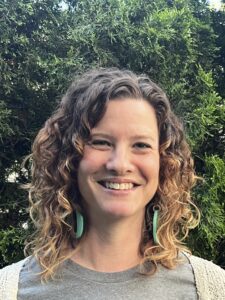Rachel Ringenberg Miller uses her own experience to offer ideas to help congregations raise up the next generation of pastors from within.
 Rachel Ringenberg Miller serves as denominational minister for ministerial leadership for Mennonite Church USA. She focuses on engaging conferences and congregations, providing resources and services to meet the diverse demands facing congregations today. She graduated from Goshen (Indiana) College and Eastern Mennonite Seminary, in Harrisonburg, Virginia, with an MDiv. She served as associate pastor for Portland (Oregon) Mennonite Church and as pastor of Shalom Mennonite Church in Newton, Kansas. Rachel attends Eighth Street Mennonite Church in Goshen, Indiana, a Central District Conference congregation.
Rachel Ringenberg Miller serves as denominational minister for ministerial leadership for Mennonite Church USA. She focuses on engaging conferences and congregations, providing resources and services to meet the diverse demands facing congregations today. She graduated from Goshen (Indiana) College and Eastern Mennonite Seminary, in Harrisonburg, Virginia, with an MDiv. She served as associate pastor for Portland (Oregon) Mennonite Church and as pastor of Shalom Mennonite Church in Newton, Kansas. Rachel attends Eighth Street Mennonite Church in Goshen, Indiana, a Central District Conference congregation.
______________________________________________
I get asked questions, like where are the pastors? How long will it take for my church to find a pastor?1 What is Mennonite Church USA doing to find more pastors?
The last question is my favorite, because it sounds like pastors are found in the hinterlands, which could not be further from the truth.
A future pastor could be that squirmy toddler sitting next you in church, the shy awkward teen who is cleaning up in the Bible Quiz tourney, the young adult who seems to float from one thing to the next, the middle-aged person who has always loved theology or maybe it’s you.
Where are the pastors? They are in your congregations already. A better question might be, “What is my congregation doing to creating spaces and opportunities for development of leadership skills?” Creating space and opportunities does not mean that you need to create a new program for the church to find volunteers for or for the current pastor to run. It’s much simpler than creating a new program. Here is what I mean, using my experience as an example. As a teenager, I and others in my youth group were regularly invited to participate in church life. We led worship, helped with Bible school, performed in the annual intergenerational production of Amahl and the Night Visitors, attended church council meetings, and sang in the choir. Did we do these things well? No, I’m sure we did not. And yet, we were invited, encouraged and, most importantly, mentored by various people in the congregation.
My home congregation saw itself as a teaching congregation, in the same vein as a teaching hospital, where people are invited to test and develop their skills in a live setting. The congregation allowed us to try things, and it was okay if we were not instantly amazing at everything we tried. We could fail, and the adults would ask us to try it again or try something else.
For example, I was once asked to be one of the dancers in Amahl and the Night Visitors, because the choreographer wanted the dancers to all be the same height, and I fit that bill. I am, however, not an elegant dancer. I am quite sure the choreographer regretted her choice, but we worked through it. Now, was I ever asked to dance again? No, I was not. But I was asked to perform in plays with no dancing.
It was due to this openness to explore gifts and skills that I eventually felt both the outer and inner call to ministry.
My experience is not unique. Several kids from my youth group have worked for MC USA churches, agencies and institutions. But also, my youth group is not unique. About every pastor, when asked how they ended up in ministry, will invariably say, “So-and-so from my congregation said to me, ‘You should consider ministry,’ after they saw me doing a thing within the congregation.”
What is MC USA doing to find pastors? The question really is what are we, as in all of us in MC USA congregations, doing to support, encourage and invite people to consider congregational ministry. Raising up pastors is something we do together and most often happens within the context of congregational ministry. Here are a few ideas for congregations to begin to support and encourage people to consider ministry:
- Love the noise that babies, children and youth bring into the worship services. The cries of babies, loud scribbles and the whispers mean that they and their parents feel comfortable to worship alongside you.
- Invite participation into worship service beyond the “youth worship service Sunday.” For example, if the congregation has a mentor program, invite mentors and mentees to lead worship together, teach Sunday school or facilitate the children’s story.
- Talk often about the ways youth and young adults can explore ministry, through participating in worship to formal programs like Ministry Inquiry Program, and then, invite them to do it.
- Include scholarships for both Mennonite ungraduated degrees and seminary degrees in your budget.
- Be aware of adult-focused ministry programs, like Journey, Instituto Bíblico Anabautista (IBA) and Seminario Bíblico Anabautista Hispano (SeBAH) .
- Remember to be gracious when mistakes are made and joyful when they do well.
The views and opinions expressed in this blog belong to the author and are not intended to represent the views of the MC USA Executive Board or staff.
Interested in submitting a blog for Menno Snapshots? Please see our blog guidelines here.

